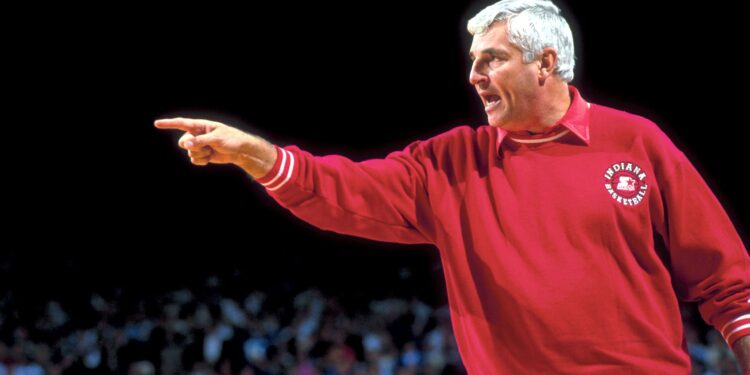By: Zachary Draves
Was Bobby Knight one of the greatest coaches of all time? Without question. Did he have one of the best basketball minds? No doubt. Did he go above and beyond the call of duty? Yes would be an understatement.
There is plenty to celebrate about Coach Knight in light of last Wednesdays’ announcement that he had passed away at the age of 83. Tributes poured in from across the basketball world and beyond from former players, fellow coaches, and others that were impacted by the legacy of Coach Knight.

(Courtesy: John Swart/Associated Press)
A legacy that included 902 career wins, three national championships with Indiana (1976, 1981, and 1987), and coaching the 1984 US Olympic team featuring Michael Jordan, Patrick Ewing, and one of his players and Indiana’s favorite son Steve Alford to the gold medal in Los Angeles.
He was known for stressing the importance of reading, his program was never riddled with a recruiting scandal, and nearly all his players graduated. When player Landon Turner was paralyzed from the chest down after a horrific car accident in 1981, Knight was there for him and his family emotionally and financially.
While there was certainly a lot of objective good, Coach Knight himself allowed for that good to be overwhelmed by his notorious temper and often volatile behavior that can be characterized as problematic at best and abusive at worst, especially by today’s standards.
Beyond the infamous chair throwing incident against Purdue in 1985, which most can look back at as something to laugh about, there are other notable incidents that were not funny in the least and showcased the qualities of a man who was completely power hungry and unable to adapt to changing society and culture around him.

(Courtesy: Youtube)
In 1979, while coaching Team USA during the Pan American Games, he was briefly detained in Puerto Rico after he allegedly assaulted a police officer over a dispute over facilities. He was convicted of a misdemeanor and never visited the island again.
During a nationally televised interview with Connie Chung in 1987, Knight said on the topic of sexual assault “I think that if rape is inevitable, relax and enjoy it.
He later added: “That’s just an old term that you’re going to use. The plane’s going down, so you have no control over it. I’m not talking about the act of rape. Don’t misinterpret me. But what I’m talking about is something happens to you, so you have to handle it − now.”
Many students protested on the campus of IU calling for his firing.
In 1991, he was caught on tape during an IU practice where he unleashed a profane tirade against his players that captures a man who was more concerned about himself more than anything his players did or didn’t do.
(Courtesy: AP Photo/Pat Sullivan)
“Now, I’m tired of this (expletive). I’m sick and tired of a (expletive) 8-10 record. I’m (expletive) tired of losing to Purdue. I’m not here to (expletive) around this week. Now, you may be, but I’m not.”
During a press conference before an NCAA tournament game in 1992 in Albuquerque, New Mexico, Knight brought a bullwhip. He then made a gesture using the whip towards one of his black players, Calbert Cheaney.
The imagery was looked at as reminiscent of slavery and evoked the ire of the Albuquerque chapter of the NAACP and black lawmakers in Indiana who demanded repercussions against him.
After losing in the NCAA tournament in 1995, Knight unleashed another verbal tirade against a moderator during a post-game press conference after the moderator had told reporters that Knight wouldn’t be appearing.
”I’ll handle this the way I want to handle it now that I’m here. You f—– it up to begin with!”
Then in 2000, in what ultimately led to his demise at IU, CNN did a story which featured a leaked video of a 1997 practice showing Knight grabbing player Neil Reed by the throat. He was fined and was put under a zero tolerance policy by then IU president Myles Brand. Shortly thereafter, Knight violated the policy where he grabbed an IU student by the arm after the student called him by his last name.
On September 10, 2000, Knight was fired from IU.
Many supporters of his rioted on campus and some issued death threats against Brand and the administration. In the midst of the fire and destruction, Knight appeared before the crowd and thanked them for their support, never mind the vandalism and violence.

(Courtesy: John Warner/Indy Star)
For a man that embraced the concept of “law and order” in the tradition of his mentor Woody Hayes or President Richard Nixon, he was willing to turn the other cheek because it ultimately was to his benefit. If that had been anything else, say an uprising against racism, he would have certainly emphasized the ethos of “law and order”.
He held a grudge against IU for years and during a 2017 interview on the Dan Patrick Show he let his feelings be known about the administration when he said “I hope they’re all dead.”
Knight vowed never to return, but he did have a change of heart and made an appearance at Assembly Hall in 2020.
So in the end, Bobby Knight was certainly a complicated figure. He did a lot of good, did a lot of bad, and had a fair share of ugly. If we are going to tell the story of his life, we have to be honest in every aspect.
Otherwise we are doing history a complete disservice and at a time when history is under assault, we cannot afford to do that.


 NFL
NFL

